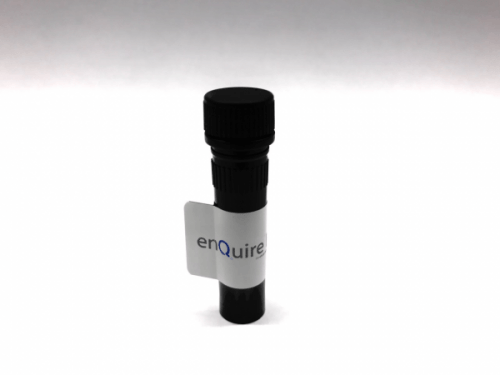Human Phospholipid scramblase 1 Recombinant Protein Product Attributes
Product Type: Recombinant Protein
Recombinant Phospholipid scramblase 1 based upon sequence from Human
Host: QP6506 protein expressed in E. coli.
Tag: GST
Protein Construction: A DNA sequence encoding the Homo sapiens (Human) Phospholipid scramblase 1, was expressed in the hosts and tags indicated. Please select your host/tag option, above.
Recommended Applications: Immunogen, Protein Standard, Cell culture, or Other Cell Biology Applications.
Application Notes: Please contact us for application specific information for QP6506.
Bioactivity Data: Untested
Full Length? Full Length
Expression Region: Glu1 – Trp318
Amino Acid Sequence: ESTGSQEQKS GVW
Purity: Greater than 80% as determined by SDS-PAGE.
Reconstitution Instructions: Concentrated protein in liquid format. Reconstitution is not necessary.
Concentration of Human Phospholipid scramblase 1 Protein:
Endotoxin Levels: Not determined.
Buffer: Tris-based buffer, 50% glycerol
Storage Conditions: Store at -20C to -80C.
| Recombinant Human Phospholipid scramblase 1 Protein General Information | |
|---|---|
| Alternate Names | |
| MMTRA1B | |
| Curated Database and Bioinformatic Data | |
| Gene Symbol | PLSCR1 |
| Entrez Gene ID | 5359 |
| Ensemble Gene ID | ENSG00000188313 |
| RefSeq Protein Accession(s) | NP_066928.1 |
| RefSeq mRNA Accession(s) | NM_021105.2, XM_005247538.3, XM_011512904.1, XM_011512906.2, XM_011512907.2, XM_017006629.1 |
| UniProt ID(s) | O15162 |
| UniGene ID(s) | Hs.130759 |
| HGNC ID(s) | HGNC:9092 |
| COSMIC ID Link(s) | PLSCR1 |
| KEGG Gene ID(s) | hsa:5359 |
| PharmGKB ID(s) | PA33419 |
| General Description of Recombinant Human Phospholipid scramblase 1 Protein. | |
| May mediate accelerated ATP-independent bidirectional transbilayer migration of phospholipids upon binding calcium ions that results in a loss of phospholipid asymmetry in the plasma membrane. May play a central role in the initiation of fibrin clot formation, in the activation of mast cells and in the recognition of apoptotic and injured cells by the reticuloendothelial system. May play a role in the antiviral response of interferon (IFN) by amplifying and enhancing the IFN response through increased expression of select subset of potent antiviral genes. May contribute to cytokine-regulated cell proliferation and differentiation. |
|
Limitations and Performance Guarantee
This is a life science research product (for Research Use Only). This product is guaranteed to work for a period of two years when stored at -70C or colder, and one year when aliquoted and stored at -20C.




There are no reviews yet.